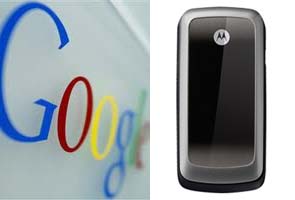- Home
- Mobiles
- Mobiles News
- After Google, now Motorola faces identity crisis
After Google, now Motorola faces identity crisis
By Matt Richtel and Jenna Wortham, New York Times | Updated: 5 June 2012 01:54 IST

Click Here to Add Gadgets360 As A Trusted Source

Advertisement
Hundreds of framed patents hang on two separate walls at the headquarters of Motorola Mobility in Libertyville, Illinois. They testify to the pride in innovation at Motorola, a luminary of American business that has survived corporate crises and enormous technological change.
But the company has never grappled with something like this: a murky future governed by Google, a powerful master with unclear intentions.
In announcing its planned $12.5 billion purchase of Motorola Mobility last week, Google emphasized its interest in the company's rich trove of 17,000 patents. That portfolio would allow Google to defend itself against foes like Apple and Microsoft in the legal arena, where billions of dollars in patent licensing fees can be indirectly negotiated through lawsuits and countersuits.
But while industry analysts and insiders say the rationale makes sense, they also say it leaves Motorola in an unusual position. Many acquisitions are aimed at creating some well-articulated synergy between the two companies, but Motorola's future role in this union - beyond patent warehouse - is unclear.
Heightening the uncertainty is that the companies involved, both of which declined to comment, are in some ways as different as two technology companies can be. Google makes Internet services and software, thrives on high profit margins and distributes its product using giant data centres. Motorola makes hardware, has modest margins on a good day and moves its products on trucks and airplanes and through brick-and-mortar stores.
Some hope the cultures will fuse and lead Motorola to a future as storied as it's past. Martin Cooper, 82, who worked at Motorola for 30 years and developed the first hand-held cell phones there, said he hoped great things would come from combining Google's momentum and confidence with Motorola's tradition of excellence in radio technology.
"The combination might make Motorola successful - again," said Mr. Cooper, whose patent from the early 1970s for cellular phone technology is among those that hang at the company's entrance.
At the least, industry analysts said Motorola almost certainly would become a laboratory for Google to seek to perfect Android, its mobile phone software, in concert with newly acquired hardware engineers. Others say Google may wind up giving financial backing to Motorola to help it revive its flagging fortunes in Europe and Asia.
But if it appears to be getting too cozy with Motorola, Google risks upsetting other mobile phone makers like HTC and Samsung, who build some of the most popular smartphones and tablets running on Android.
"How do you compete with your partners and also work with them?" said Ben Schachter, an analyst with Macquarie Capital, who called the situation a "head-scratcher."
Google has said it will allow Motorola to run independently. But some analysts and investors think Google could markedly pare back or sell big parts of Motorola that create conflicts with partners or are not central to its goals. And that makes for uncertain times for the 19,000 employees at Motorola Mobility in Libertyville, a northern suburb of Chicago, and around the world.
"It's like, thanks for everything you did in the 20th century, but you're being bought by a search engine," said Roger Entner, a telecommunications industry analyst and founder of Recon Analytics, a market research firm. He added, "Nobody ever buys a company and leaves it alone."
Motorola traces its beginnings to 1928, when two brothers, Paul and Joseph Galvin, started a company making power converters for household radios. In 1947 it changed its name to Motorola, after its popular car radio brand. The company produced radio phones that helped American troops communicate in World War II, car phones in the 1980s, and the trend-setting MicroTac and Razr cellphones, among other products.
But in recent years, after the Razr's popularity faded, Motorola flirted with financial doom. It was only in the last few quarters that it surged back under the leadership of Sanjay Jha, a former executive at Qualcomm, who joined Motorola in 2008 when it was in danger of missing the rise of the smartphone.
He made significant changes, cutting thousands of employees and splitting the business in two: Motorola Solutions, which sells equipment to businesses, and Motorola Mobility, which handles consumer products like phones and set-top boxes.
Motorola Mobility scaled back distribution in Europe and Asia, focusing its efforts on North America, Latin America and China. It emphasized fewer phone models and hitched its fortunes to Google's Android software.
In the company's second quarter this year, it reported revenue of $3.34 billion and a profit of $26 million. That was up from revenue of $2.6 billion and a loss of $87 million for the period a year earlier.And the company shipped 11 million devices in the quarter, up from 8.3 million in the period a year earlier. Most of the increase came from smartphones - to 4.4 million, from 2.7 million in the period a year earlier.
The company has been producing products that dazzle gadget fans - no easy feat when taking on the iPhone. During the Consumer Electronics Show in Las Vegas in January, Mr. Jha wowed audiences with the Motorola Xoom, a tablet computer than many considered to be the first real contender to Apple's iPad.
But the shipment numbers still pale in comparison to, say, the second quarter of 2006, when Razr sales were soaring. Motorola shipped 51.9 million of them that quarter. That was just before the phone's price and popularity began to slip, dragging Motorola's fortunes down with it.
Lawrence Harris, a senior research analyst with C.L. King & Associates, an investment bank, said the mercurial nature of the phone business might wind up feeling very foreign to Google - and challenging. He said he was also not sure that Google had put that much thought into what to do with the physical manufacturing, the distribution and the sales staff. Even further afield for Google is Motorola's involvement in making television set-top boxes, a modest part of its business.
"The priority is the patents," Mr. Harris said, noting that the acquisition had come together quickly, suggesting that Google has not had time to devise its entire strategy. "Then they'll have to address how to get their arms around manufacturing."
In announcing the deal, Larry Page, Google's chief executive, said that the two companies would "create amazing user experiences that supercharge the entire Android ecosystem."
Kevin Smithen, an analyst at Macquarie Capital, said Google might eventually sell off the phone and set-top businesses. Motorola would be "pared down if Google goes in that direction," he said.
But others say Google has the chance to help Motorola grow. Carolina Milanesi, an industry analyst with Gartner, said Google's ample pocketbook could help Motorola return to former glory by expanding in places like Europe and Asia, and also by helping it sell lower-cost smartphones that might appeal to a mass market.
Gartner research puts Motorola's 2010 share of the mobile phone market at 2.4 percent, down from 4.8 percent in 2009, though Ms. Milanesi noted that more profitable smartphones were making up an increasing share of Motorola's sales.
"Money from Google could get them back, if not where they were, to a more prominent role," she said.
But the company has never grappled with something like this: a murky future governed by Google, a powerful master with unclear intentions.
In announcing its planned $12.5 billion purchase of Motorola Mobility last week, Google emphasized its interest in the company's rich trove of 17,000 patents. That portfolio would allow Google to defend itself against foes like Apple and Microsoft in the legal arena, where billions of dollars in patent licensing fees can be indirectly negotiated through lawsuits and countersuits.
But while industry analysts and insiders say the rationale makes sense, they also say it leaves Motorola in an unusual position. Many acquisitions are aimed at creating some well-articulated synergy between the two companies, but Motorola's future role in this union - beyond patent warehouse - is unclear.
Heightening the uncertainty is that the companies involved, both of which declined to comment, are in some ways as different as two technology companies can be. Google makes Internet services and software, thrives on high profit margins and distributes its product using giant data centres. Motorola makes hardware, has modest margins on a good day and moves its products on trucks and airplanes and through brick-and-mortar stores.
Some hope the cultures will fuse and lead Motorola to a future as storied as it's past. Martin Cooper, 82, who worked at Motorola for 30 years and developed the first hand-held cell phones there, said he hoped great things would come from combining Google's momentum and confidence with Motorola's tradition of excellence in radio technology.
"The combination might make Motorola successful - again," said Mr. Cooper, whose patent from the early 1970s for cellular phone technology is among those that hang at the company's entrance.
At the least, industry analysts said Motorola almost certainly would become a laboratory for Google to seek to perfect Android, its mobile phone software, in concert with newly acquired hardware engineers. Others say Google may wind up giving financial backing to Motorola to help it revive its flagging fortunes in Europe and Asia.
But if it appears to be getting too cozy with Motorola, Google risks upsetting other mobile phone makers like HTC and Samsung, who build some of the most popular smartphones and tablets running on Android.
"How do you compete with your partners and also work with them?" said Ben Schachter, an analyst with Macquarie Capital, who called the situation a "head-scratcher."
Google has said it will allow Motorola to run independently. But some analysts and investors think Google could markedly pare back or sell big parts of Motorola that create conflicts with partners or are not central to its goals. And that makes for uncertain times for the 19,000 employees at Motorola Mobility in Libertyville, a northern suburb of Chicago, and around the world.
"It's like, thanks for everything you did in the 20th century, but you're being bought by a search engine," said Roger Entner, a telecommunications industry analyst and founder of Recon Analytics, a market research firm. He added, "Nobody ever buys a company and leaves it alone."
Motorola traces its beginnings to 1928, when two brothers, Paul and Joseph Galvin, started a company making power converters for household radios. In 1947 it changed its name to Motorola, after its popular car radio brand. The company produced radio phones that helped American troops communicate in World War II, car phones in the 1980s, and the trend-setting MicroTac and Razr cellphones, among other products.
But in recent years, after the Razr's popularity faded, Motorola flirted with financial doom. It was only in the last few quarters that it surged back under the leadership of Sanjay Jha, a former executive at Qualcomm, who joined Motorola in 2008 when it was in danger of missing the rise of the smartphone.
He made significant changes, cutting thousands of employees and splitting the business in two: Motorola Solutions, which sells equipment to businesses, and Motorola Mobility, which handles consumer products like phones and set-top boxes.
Motorola Mobility scaled back distribution in Europe and Asia, focusing its efforts on North America, Latin America and China. It emphasized fewer phone models and hitched its fortunes to Google's Android software.
In the company's second quarter this year, it reported revenue of $3.34 billion and a profit of $26 million. That was up from revenue of $2.6 billion and a loss of $87 million for the period a year earlier.And the company shipped 11 million devices in the quarter, up from 8.3 million in the period a year earlier. Most of the increase came from smartphones - to 4.4 million, from 2.7 million in the period a year earlier.
The company has been producing products that dazzle gadget fans - no easy feat when taking on the iPhone. During the Consumer Electronics Show in Las Vegas in January, Mr. Jha wowed audiences with the Motorola Xoom, a tablet computer than many considered to be the first real contender to Apple's iPad.
But the shipment numbers still pale in comparison to, say, the second quarter of 2006, when Razr sales were soaring. Motorola shipped 51.9 million of them that quarter. That was just before the phone's price and popularity began to slip, dragging Motorola's fortunes down with it.
Lawrence Harris, a senior research analyst with C.L. King & Associates, an investment bank, said the mercurial nature of the phone business might wind up feeling very foreign to Google - and challenging. He said he was also not sure that Google had put that much thought into what to do with the physical manufacturing, the distribution and the sales staff. Even further afield for Google is Motorola's involvement in making television set-top boxes, a modest part of its business.
"The priority is the patents," Mr. Harris said, noting that the acquisition had come together quickly, suggesting that Google has not had time to devise its entire strategy. "Then they'll have to address how to get their arms around manufacturing."
In announcing the deal, Larry Page, Google's chief executive, said that the two companies would "create amazing user experiences that supercharge the entire Android ecosystem."
Kevin Smithen, an analyst at Macquarie Capital, said Google might eventually sell off the phone and set-top businesses. Motorola would be "pared down if Google goes in that direction," he said.
But others say Google has the chance to help Motorola grow. Carolina Milanesi, an industry analyst with Gartner, said Google's ample pocketbook could help Motorola return to former glory by expanding in places like Europe and Asia, and also by helping it sell lower-cost smartphones that might appeal to a mass market.
Gartner research puts Motorola's 2010 share of the mobile phone market at 2.4 percent, down from 4.8 percent in 2009, though Ms. Milanesi noted that more profitable smartphones were making up an increasing share of Motorola's sales.
"Money from Google could get them back, if not where they were, to a more prominent role," she said.
Comments
Get your daily dose of tech news, reviews, and insights, in under 80 characters on Gadgets 360 Turbo. Connect with fellow tech lovers on our Forum. Follow us on X, Facebook, WhatsApp, Threads and Google News for instant updates. Catch all the action on our YouTube channel.
Popular on Gadgets
- Samsung Galaxy Unpacked 2026
- iPhone 17 Pro Max
- ChatGPT
- iOS 26
- Laptop Under 50000
- Smartwatch Under 10000
- Apple Vision Pro
- Oneplus 12
- OnePlus Nord CE 3 Lite 5G
- iPhone 13
- Xiaomi 14 Pro
- Oppo Find N3
- Tecno Spark Go (2023)
- Realme V30
- Best Phones Under 25000
- Samsung Galaxy S24 Series
- Cryptocurrency
- iQoo 12
- Samsung Galaxy S24 Ultra
- Giottus
- Samsung Galaxy Z Flip 5
- Apple 'Scary Fast'
- Housefull 5
- GoPro Hero 12 Black Review
- Invincible Season 2
- JioGlass
- HD Ready TV
- Latest Mobile Phones
- Compare Phones
Latest Gadgets
- Vivo V70
- Vivo V70 Elite
- Google Pixel 10a
- Tecno Camon 50
- Tecno Camon 50 Pro
- Lava Bold N2
- Vivo V60 Lite 4G
- Tecno Pova Curve 2 5G
- Asus Vivobook 16 (M1605NAQ)
- Asus Vivobook 15 (2026)
- Infinix Xpad 30E
- Brave Ark 2-in-1
- boAt Chrome Iris
- HMD Watch P1
- Xiaomi QLED TV X Pro 75
- Haier H5E Series
- Asus ROG Ally
- Nintendo Switch Lite
- Haier 1.6 Ton 5 Star Inverter Split AC (HSU19G-MZAID5BN-INV)
- Haier 1.6 Ton 5 Star Inverter Split AC (HSU19G-MZAIM5BN-INV)
© Copyright Red Pixels Ventures Limited 2026. All rights reserved.


![[Partner Content] OPPO Reno15 Series: AI Portrait Camera, Popout and First Compact Reno](https://www.gadgets360.com/static/mobile/images/spacer.png)









